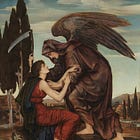To get these updates in your inbox, subscribe to Footnotes and Tangents and turn on notifications for the Cromwell Trilogy.
Welcome to week 22 of Wolf Crawl
This week, we are reading the first part of ‘The Black Book, London, January – April 1536’ up to page 223 of the Fourth Estate paperback edition and the line: ‘But her hands and feet are cold and her heart is like a stone.’
You will find everything you need for this read-along on the main Cromwell trilogy page of my website, including:
Weekly updates, like this one
Online resources about Mantel’s writing and Thomas Cromwell
This is a long post and may get clipped by your email provider. It is best viewed online here.
Last week’s posts:
This week’s story
January 1536. The chapter begins with the Queen of England on fire. Cromwell investigates why it was allowed to happen and consults the Black Book. ‘It orders the household: orders everything.’ Jane Rochford is on hand to fill in the gaps concerning the comings and goings in the queen’s chambers.
Cromwell considers the borderlands between truth and lies. He surveys this territory with a helpful example: What happened to Anthony’s teeth? There are many ‘twisted tales’ but surely only one reality? Perhaps, but it makes people happy when Gregory believes tall tales. Cromwell’s son pretends to be the king, and Master Secretary hides a smile with his hand.
On the day of the tournament, he makes his excuses so as not to see Gregory in danger. He remembers the advice of an old knight he knew in Venice: ‘Look, he said: there are three ways to fail. Horse can fail. Boys can fail. Nerve can fail.’
But it is not Gregory who fails in the lists. It is the king. He lies dead in a tent when Cromwell enters. Later, he remembers the Boleyns shouting their name and Norfolk bellowing, ‘Anne cannot rule. Me, me, me.’ He, Cromwell, bats the duke away and raises the king from the dead. Afterwards, they will say this never happened.
‘It was a bad moment for me,’ he tells Richard Cromwell that night, ‘I have everything, you would think. And yet take Henry away and I have nothing.’
Now the contest is sharper: the stakes clearer, the risks laid bare. News arrives that Anne has miscarried again, and the king makes it clear that she is to blame. He consults Cromwell and Cranmer: How can I be rid of her? In an antechamber, the two councillors talk things over as Cromwell eases Cranmer into the idea of a future world without Anne Boleyn.
Keep reading with a 7-day free trial
Subscribe to Footnotes and Tangents to keep reading this post and get 7 days of free access to the full post archives.





